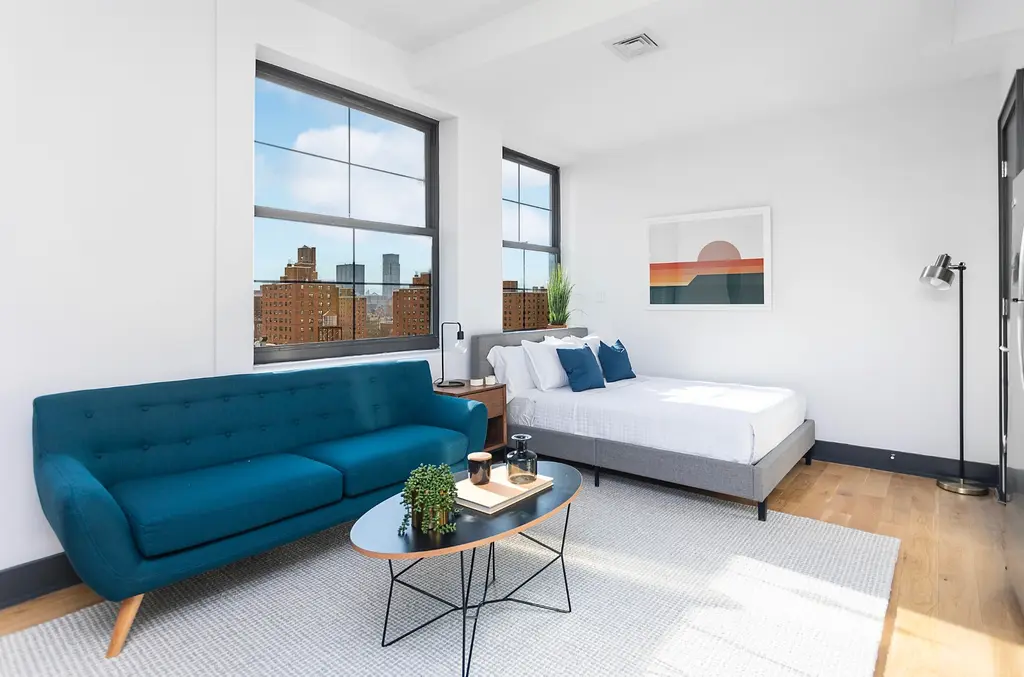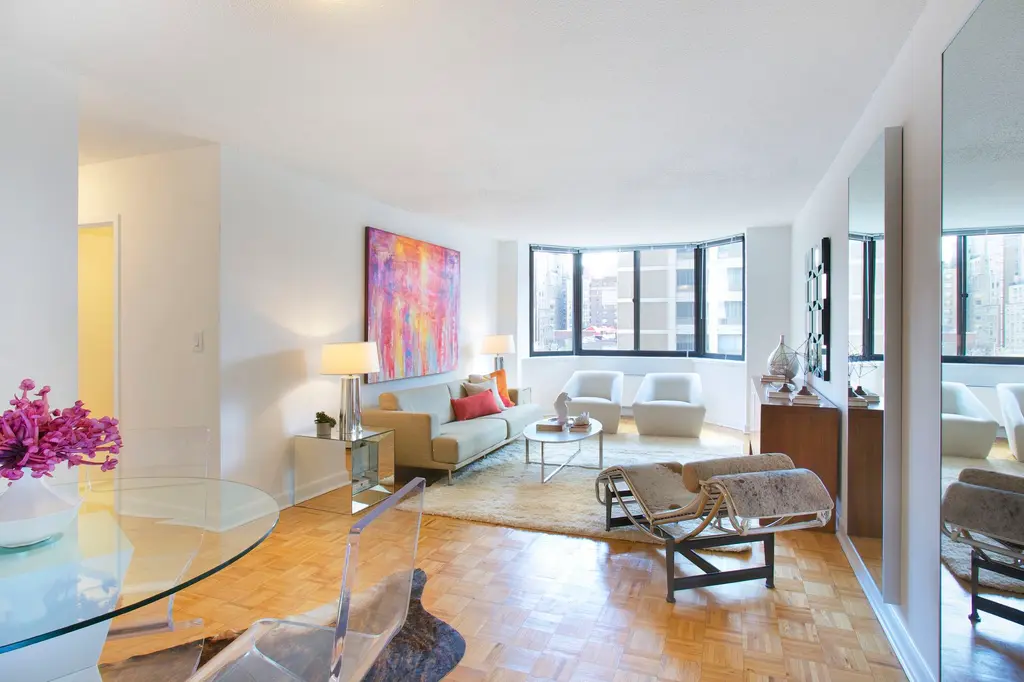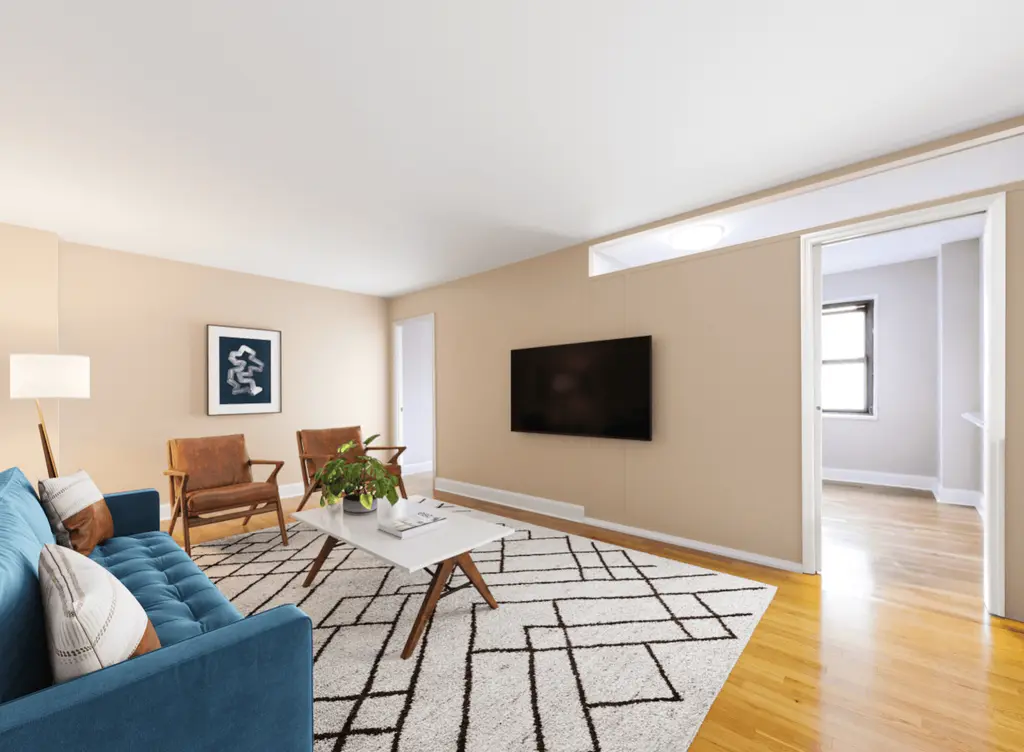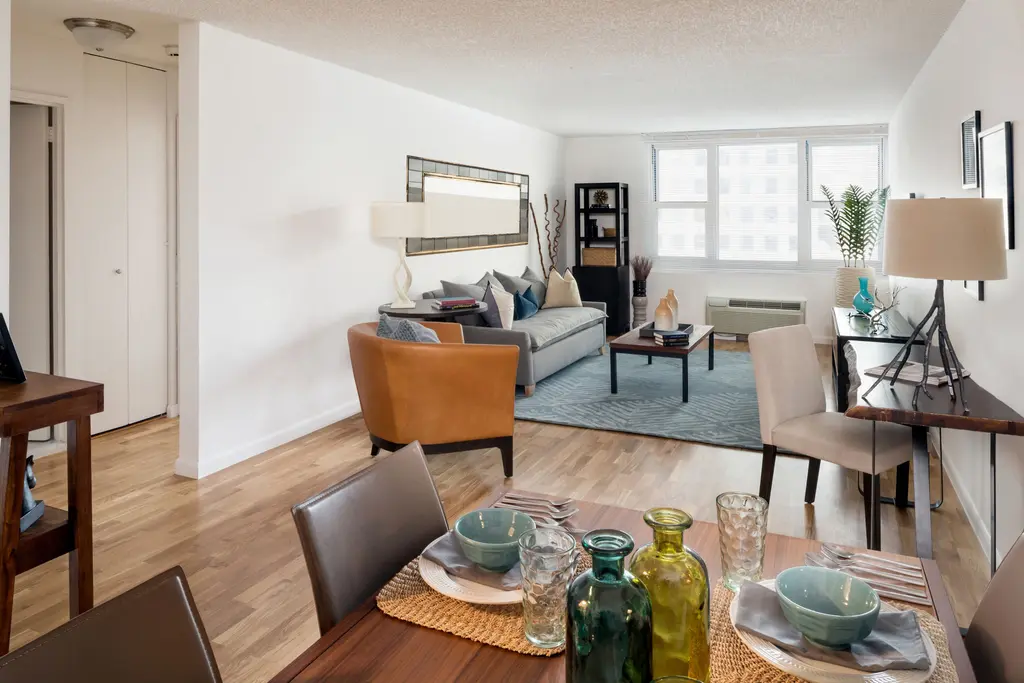 Apartment at The Concerto, a no-fee building (Brodsky Organization)
Apartment at The Concerto, a no-fee building (Brodsky Organization)
Newcomers are often shocked to discover that in New York City, broker fees aren't only applicable when buying a home but also when renting one. The practice has also become increasingly contentious in recent years as rents have climbed to new highs, and a rent-stabilized apartment with a $15,000 broker fee recently went viral.
Housing advocates argue that broker fees create an unfair obstacle for low- and middle-income renters, especially at a time when many renters are finding their apartments through online searches rather than working one-on-one with a broker. However, landlords and the real estate industry disagree, saying that laws obligating landlords to pay the fees will result in higher rents. This article explains how broker fees are set, how renters can best deal with them, and how they’ve made the news again.
Housing advocates argue that broker fees create an unfair obstacle for low- and middle-income renters, especially at a time when many renters are finding their apartments through online searches rather than working one-on-one with a broker. However, landlords and the real estate industry disagree, saying that laws obligating landlords to pay the fees will result in higher rents. This article explains how broker fees are set, how renters can best deal with them, and how they’ve made the news again.
In this article:
What are broker fees?
Broker fees are paid to a licensed real estate agent or broker in exchange for representing a prospective buyer or renter during a real estate transaction. Outside New York City and Boston, however, broker fees are only paid when a property is sold. In the case of a sale, the fee is typically a 4 to 6 percent commission on the closing price of a property, and the fee is split between the "listing agent" (the agent representing the seller) and "buyer agent" (the agent representing the buyer). If the listing or seller agent also represents the buyer, then the entire commission is directed to one agent.In New York City, broker fees also apply to most rental units. When they are, the fee, which is negotiated between the broker and renter, is typically 10 to 15 percent of the first year's rent on the property. In other words, if you're renting an apartment that costs $3,000 a month, and your annual rent will be $36,000, expect to pay anywhere from $3,600 to $5,400 in brokerage fees on top of your first month's rent.
In summer 2023, a report found that new lease signings dipped at a time when they would normally be at their peak. Appraiser Jonathan Miller attributed some of it to renters finding it cheaper to stay where they are rather than face higher rents, the labor of moving, and, yes, broker fees in the search for a new place. However, it must be noted that this is a factor in the low vacancy rate that drove rents to record highs.
In summer 2023, a report found that new lease signings dipped at a time when they would normally be at their peak. Appraiser Jonathan Miller attributed some of it to renters finding it cheaper to stay where they are rather than face higher rents, the labor of moving, and, yes, broker fees in the search for a new place. However, it must be noted that this is a factor in the low vacancy rate that drove rents to record highs.
Why don't all rentals have a broker fee?
When inventory is low, and there is high competition for units, brokerage fees are the norm and tend to increase (e.g., after months of low inventory, in summer 2022, brokerage fees in New York have started to exceed the normal 10 to 15 percent, with reports of some brokers asking for close to 20 percent). On the flip side, when there is a surplus of apartments on the market and landlords and management companies are scrambling to find tenants, brokerage fees sometimes disappear altogether. This doesn't mean that agents and brokers aren't still being paid for their hard work. It simply means that in a renter's market, the fees are typically paid by landlords and management companies rather than renters.Is it legal to charge renters a broker fee?
An addendum to the Housing Security & Tenant Protection Act of 2019 and the Housing Stability and Tenant Protection Act of 2019 states that broker fees are legal in New York State. As outlined in a May 2021 Department of State memo: "The Acts do not, in and of themselves, prohibit a landlord's agent from collecting a "broker fee" from a prospective tenant, nor do they authorize the Department to commence a disciplinary proceeding against a landlord's agent for doing so." But this may change in 2023.Are broker fees negotiable?
The good news is that no law dictates how much or how little agents and brokers can charge as a fee when representing renters. As a result, broker fees are always negotiable. While renters may have less leverage in a competitive market (i.e., in a market where the demand for rentals outpaces the available surplus), this doesn't mean they can't try to negotiate. The best approach is to agree upon a set percentage or flat fee going into any rental hunt. Most but not all representatives will be happy to negotiate. Also, having clarity about the fee structure from the onset is the best way to avoid surprises and the disappointment of losing out on a desirable apartment down the line because the broker's fee is untenable.What's going on with broker fees?
In early 2020, broker fees on rentals were briefly banned. This ban was highly controversial and struck down a few days later, but then temporarily reinstated as the judgment made its way through the state’s higher court. By early 2021, though, agents and brokers were allowed to start charging broker fees again.Shortly after broker fees were reinstated, Zohran Mamdani, a State Assemblymember representing District 036 (a district covering the Ditmars Steinway neighborhood of Queens where 75 percent of homes are renter-occupied), introduced Assembly Bill A7934A. If passed, the bill will once again prohibit "landlords, lessors, sub-lessors and grantors from demanding brokers' fees from a tenant.
Most recently, New York City Councilmember Chi Ossé introduced the FARE (Fairness in Apartment Rental Expenses) Act. In a post on all his social networks, he points out that regardless of who hires the broker – the landlord to fill a vacancy, or the tenant to find an apartment – the onus is on the tenant to pay the broker’s fee. Under the FARE Act, only the party who hired the broker would have to pay the broker. The real estate industry is against it, but it has attracted substantial support from several of Ossé's City Council colleagues, and Julie Menin, chair of the council's Committee on Consumer and Worker Protections, has committed to holding a hearing.
Recent No-Fee Rental Listings

East River Lofts, #7F (Living New York)

No. 3 at Packard Square, #8E (Corcoran Group)

South Park Tower, #17G (OMG Marketing)

James Marquis, #10A (Rentals Manager)

600 Washington Street, #711 (Equity Residential)

Embassy House, #16O (Stellar Management)

The Willoughby, #33E (Rose Associates Inc)
Gateway Plaza Battery Park City, #5E
$9,490 (+.7%)
Battery Park City | Rental | 3 Bedrooms, 2 Baths | 1,249 ft2

Gateway Plaza Battery Park City, #5E (Rentals Manager)

Anagram Columbus Circle, #19B (Rose Associates)

The Pierrepont, #10A (Rose Associates)

Contributing Writer
Cait Etherington
Cait Etherington has over twenty years of experience working as a journalist and communications consultant. Her articles and reviews have been published in newspapers and magazines across the United States and internationally. An experienced financial writer, Cait is committed to exposing the human side of stories about contemporary business, banking and workplace relations. She also enjoys writing about trends, lifestyles and real estate in New York City where she lives with her family in a cozy apartment on the twentieth floor of a Manhattan high rise.








 6sqft delivers the latest on real estate, architecture, and design, straight from New York City.
6sqft delivers the latest on real estate, architecture, and design, straight from New York City.
